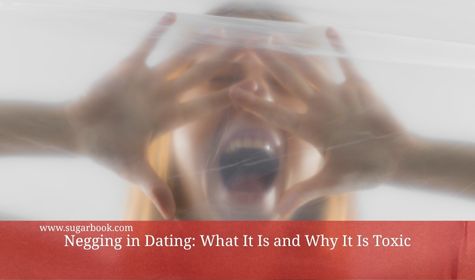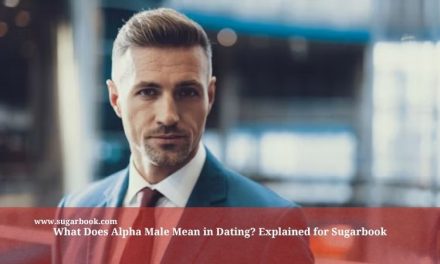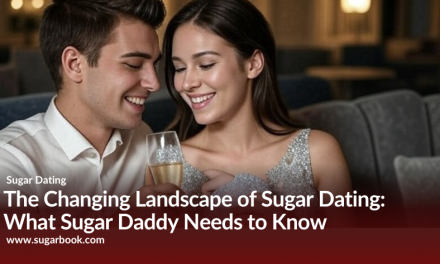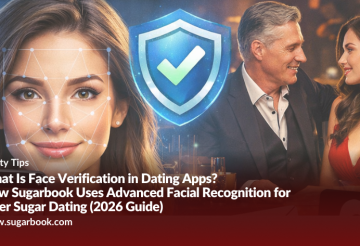
Meet successful sugar daddies and confident sugar babies on the world’s leading sugar dating app. Join free today.
In the complex world of modern dating, where confidence is celebrated and charm is often mistaken for authenticity, a dangerous tactic called negging continues to surface. Often disguised as a playful insult or a backhanded compliment, negging in dating is not harmless flirting—it’s a subtle psychological strategy designed to chip away at someone’s self-esteem for control.
As awareness around emotional manipulation grows, it’s critical to understand what negging really is, why it’s toxic, and how to recognize and reject it. Whether you’re navigating dating apps or real-world encounters, knowing the signs of negging can help protect your emotional health and maintain healthy relationship boundaries.
Contents
- Negging Meaning: What Is Negging in Dating?
- The Psychology Behind Negging in Dating
- Common Examples of Negging in Dating
- Negging in Dating vs Teasing: What’s the Difference?
- Why Negging in Dating Is Toxic
- Who Uses Negging in Dating and Why?
- How to Respond to Negging in Dating
- Negging in Online Dating Apps
- Recognizing Negging Early: Red Flags to Watch For
- Why Raising Awareness of Negging in Dating Matters
- Conclusion: Say No to Negging in Dating
Negging Meaning: What Is Negging in Dating?
Negging is a form of emotional manipulation where someone gives a backhanded compliment or insult masked as flirtation. The goal of negging in dating is to undermine the confidence of the target, making them more vulnerable to the manipulator’s attention and validation.
For example, a person might say, “You’re pretty cute for someone who doesn’t usually wear makeup,” or “You’re not my usual type, but there’s something about you.” These comments may sound harmless, but they’re designed to provoke self-doubt while still appearing flirtatious.
Negging in dating preys on insecurities. By subtly lowering someone’s self-worth, the manipulator positions themselves as a source of approval, creating an unhealthy power dynamic from the beginning.
The Psychology Behind Negging in Dating
Understanding the psychology of negging in dating reveals why this tactic is especially damaging. Negging is rooted in control and power—it’s not about mutual attraction or genuine connection. It often comes from individuals who feel insecure themselves but mask their vulnerability through dominance and superiority.
When someone is on the receiving end of negging in dating, they may feel confused or even intrigued. The mixed signals create a cognitive dissonance that causes the person to seek the manipulator’s validation, hoping to “earn” approval. This dynamic can create a toxic cycle, where the more one feels rejected, the more they try to impress the other.
Psychologically, this mirrors the reward/punishment mechanism seen in abusive relationships. Negging in dating is an early red flag that may lead to more harmful patterns over time.
Common Examples of Negging in Dating
Negging in dating often hides in plain sight. Some common examples include:
-
“You’d be really hot if you lost a few pounds.”
-
“You’re not like most girls—most are so annoying.”
-
“I like how you don’t try too hard with your looks.”
-
“That’s a bold outfit—takes confidence to wear that.”
In each case, negging combines an insult with just enough flattery to create confusion. These statements are meant to make the target question themselves, while subconsciously increasing their desire for the manipulator’s approval.
Negging in dating can also extend beyond words. Ignoring someone in a group setting, making them the butt of a joke, or offering disapproving body language can all serve the same purpose.
Negging in Dating vs Teasing: What’s the Difference?
It’s important not to confuse negging in dating with lighthearted teasing. Teasing, when done respectfully, can be a form of mutual affection and connection. Both parties feel good, and there’s a sense of emotional safety.
Negging in dating, however, is one-sided and strategic. The goal is not to make someone laugh but to create doubt. Teasing builds rapport—negging destroys confidence.
Here are some key differences:
-
Teasing strengthens bonds; negging breaks self-esteem.
-
Teasing respects boundaries; negging exploits insecurities.
-
Teasing is mutual; negging is manipulative.
Knowing the difference helps you set clear emotional boundaries and avoid toxic dating behaviors disguised as jokes.
Why Negging in Dating Is Toxic
Negging in dating is toxic because it manipulates emotional vulnerability for personal gain. It undermines the foundation of healthy relationships—trust, respect, and equality.
Here’s why negging is harmful:
-
Erodes self-esteem: Repeated exposure to negging causes individuals to internalize negative beliefs about themselves.
-
Creates dependence: The manipulator becomes a source of validation, creating an imbalanced emotional reliance.
-
Fuels emotional confusion: Mixed messages lead to stress, anxiety, and distorted self-perception.
-
Lays the groundwork for emotional abuse: Negging often evolves into gaslighting, criticism, and other toxic behaviors.
Negging in dating isn’t just poor etiquette—it’s psychological harm dressed as seduction.
Who Uses Negging in Dating and Why?
Negging in dating is often used by people who lack the confidence to build genuine connections. It is especially common in communities that promote pickup artistry or so-called “alpha” behavior. These individuals are taught that lowering someone else’s confidence increases their chances of attraction and control.
Unfortunately, this approach attracts vulnerable individuals and promotes unhealthy relationship dynamics. The person using negging in dating may not even realize the long-term damage they’re causing.
Often, negging appeals to those who are emotionally unavailable or seeking control rather than true intimacy. Recognizing this behavior early helps avoid entanglement in emotionally exploitative relationships.
How to Respond to Negging in Dating
The best way to respond to negging in dating is to call it out, set clear boundaries, and walk away if necessary. You don’t owe anyone emotional labor—especially not someone who uses manipulation as a flirting strategy.
Here are some healthy ways to respond:
-
Stay calm and confident: Don’t let the comment shake your self-worth.
-
Call it out directly: “That sounded more like an insult than a compliment.”
-
Set boundaries: “I’m not interested in talking to someone who makes me feel less than.”
-
Walk away: You have every right to end the interaction.
You don’t need to argue or explain. The goal of negging in dating is to provoke a reaction—refusing to engage is the most powerful response.
Negging in Online Dating Apps
With the rise of dating apps, negging in dating has found a new playground. Short bios and text-based communication give more room for subtle insults and backhanded messages.
Examples of negging in dating apps include:
-
“You’re pretty, but you look like you’d be high maintenance.”
-
“You must get a lot of messages—too bad most guys only want one thing.”
-
“I almost swiped left, but something told me to give you a chance.”
These comments are meant to set the manipulator apart by making you question your worth. It’s important to remember: respectful people don’t flirt by tearing others down.
If someone uses negging in a dating app, it’s a red flag that they may not respect you offline either.
Recognizing Negging Early: Red Flags to Watch For
Protecting yourself starts with learning to recognize early signs of negging in dating. Common red flags include:
-
You feel unsure after compliments.
-
The person puts down your interests, looks, or achievements.
-
You feel the need to prove yourself.
-
Their attention feels conditional.
-
You’re frequently confused about whether they like you.
If any of these resonate, it may be time to reevaluate the dynamic. Trust your gut—if someone makes you feel small, it’s not attraction, it’s manipulation.
Why Raising Awareness of Negging in Dating Matters
Negging in dating is more than an uncomfortable experience—it reflects a larger issue of emotional safety in relationships. Raising awareness helps protect individuals from falling into toxic situations and promotes healthier connections based on respect and equality.
By educating ourselves and others about negging in dating, we reinforce boundaries, affirm self-worth, and align dating culture with emotional intelligence and empathy.
Ending the normalization of toxic tactics like negging requires collective change, starting with conversations like these.
Conclusion: Say No to Negging in Dating
Negging in dating may be presented as flirtation, but it is manipulation in disguise. Whether it comes as a joke, a compliment with a sting, or a subtle put-down, the intent is always the same—to gain control by lowering someone’s self-esteem.
True attraction should feel safe, uplifting, and mutual. If someone uses negging in dating, they’re not expressing interest—they’re asserting dominance.
Protect your emotional well-being by recognizing negging for what it is and standing firm in your worth. You deserve connection built on honesty and respect—not games and mind tricks.
FAQ
Q1: What does negging mean in dating?
Negging is a subtle put-down disguised as a compliment – meant to lower your self-esteem and gain control.
Q2: How do I know if someone is negging me?
If compliments feel shady or make you second-guess your worth, that’s a red flag. Trust your gut.
Q3: Is negging a form of manipulation?
Yes. It’s emotionally manipulative and often used to gain power in a relationship dynamic.
Q4: Why do people neg in dating?
Usually to feel superior or gain control by making the other person feel insecure – it’s unhealthy behavior.
Q5: What should I do if someone negs me?
Call it out or walk away. You deserve someone who lifts you up, not tears you down.
Want to build better relationships? Check out how to spot one-sided dating dynamics.
Red flag alert? Read about when it’s time to let go.
If you’re exploring power balance, here’s how younger sugar daddies flip the script.
Learn how to avoid fake profiles and emotional manipulation.













